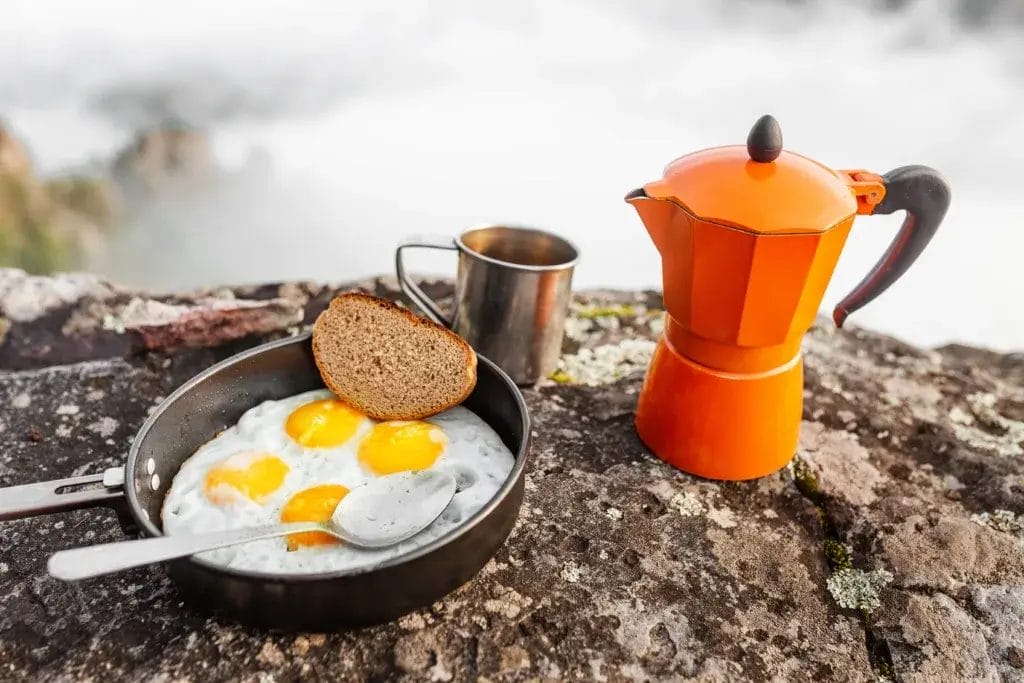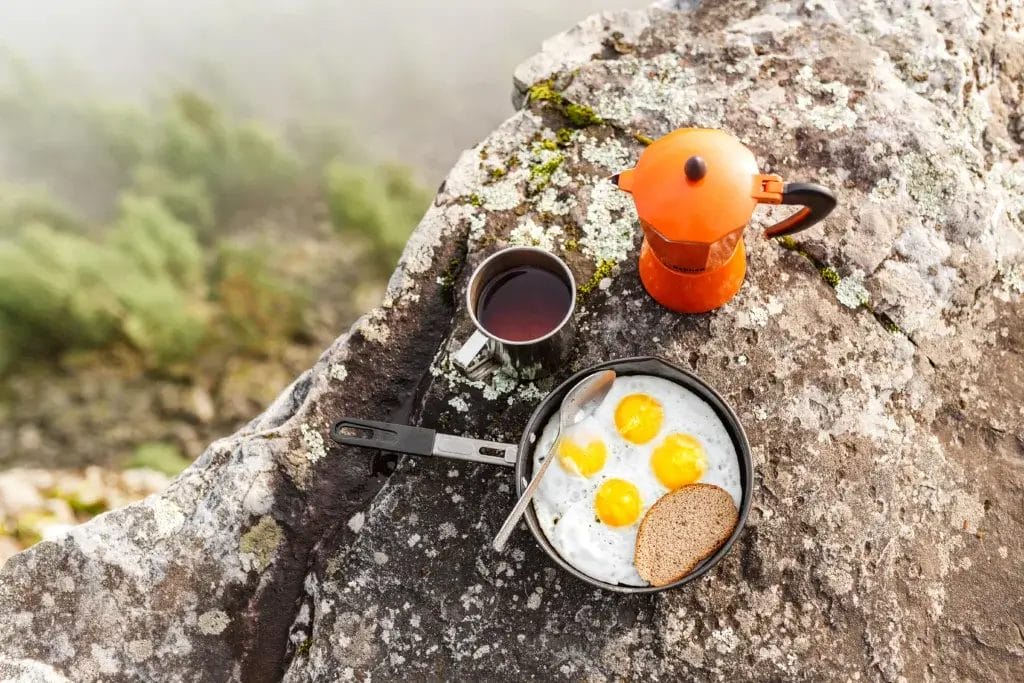How to Pack Eggs for Camping: Smart Tips for Hassle-Free Outdoor Meals
Camping trips are all about enjoying nature and tasty meals. Eggs are a great food to bring along, but packing them can be tricky.
We’ve got some easy ways to keep your eggs safe and fresh on your outdoor adventures.

The best way to pack eggs for camping is to crack them into a sealed container or water bottle before your trip. This method prevents breakage and saves space.
If you prefer whole eggs, try using a plastic egg carrier or wrapping each egg in paper towels and putting them in a hard container with padding.
Eggs are so versatile for camping meals. You can fry them up for breakfast, add them to trail mix for extra protein, or use them in campfire baked goods.
With the right packing method, you’ll be able to enjoy fresh eggs throughout your trip without worry.
Preparing Eggs for Your Camping Trip
Eggs are a camping staple, but packing them can be tricky. We’ll explore the best ways to bring eggs on your outdoor adventure, from fresh to powdered options.
Choosing the Right Type of Eggs
Fresh eggs are a great choice for short trips. If you have backyard chickens, their unwashed eggs can last up to two weeks without refrigeration. Store-bought eggs need to stay cool, so they’re better for car camping with a cooler.
Powdered eggs are lightweight and long-lasting. They’re perfect for backpacking or extended trips. Just add water to reconstitute them.
Liquid eggs in cartons are convenient but require constant refrigeration. They’re best for RV camping or when you have reliable cooling.
Dehydrated eggs are another lightweight option. They rehydrate quickly and taste similar to fresh eggs.
Packing Fresh Eggs Safely
To protect fresh eggs, we recommend using a hard-sided container. Plastic egg carriers work well, but a wide-mouthed water bottle can also do the trick.
For extra safety, try this method:
- Crack eggs into a clean plastic bottle
- Seal tightly
- Keep cold in a cooler
This way, you avoid broken shells in your camping gear.
Another option is to pre-cook your eggs. Hard-boiled eggs last up to a week when kept cool. They’re great for quick snacks or adding to salads.
Alternative Egg Options
Powdered eggs are a camper’s friend. They’re light, compact, and last for months. To use them, mix one part powder with two parts water. They work well in scrambles, omelets, and baking.
Dehydrated eggs are similar to powdered but often have a better texture. They rehydrate quickly and can be used just like fresh eggs.
For the adventurous, try freeze-dried eggs. They’re the lightest option and have a long shelf life. They’re a bit pricier but great for ultralight backpacking.
72 Servings
Packing Methods for Eggs
Eggs are a camping staple, but they can be tricky to transport. We’ve got some great ways to keep your eggs safe and fresh on your next outdoor adventure.
Using Egg Cartons and Cases
Egg cartons are a tried-and-true method for packing eggs. We recommend using plastic egg holders or camping egg carriers designed for outdoor trips. These are sturdier than cardboard and protect eggs better.
Styrofoam cartons work well too. They offer good insulation and cushioning. If you’re using a regular carton, wrap it in a soft cloth for extra protection.
For longer trips, consider a hard-sided egg case. These have individual compartments and snap shut securely. They’re great for bumpy roads or backpacking.
Carry a dozen eggs and whip up a breakfast feast the next time you're car camping or backpacking!
Securing Eggs in Containers
Airtight containers are another great option for egg storage. We like using mason jars or plastic containers with tight-fitting lids.
Here’s a neat trick: Put some padding at the bottom of the container. Tissue paper or paper towels work well. Then nestle your eggs in gently.
For extra security, you can wrap each egg in a paper towel. This helps prevent cracking if they bump into each other.
Fill any empty spaces with more padding. This stops the eggs from moving around too much during travel.
Pre-Cracking Eggs
Pre-cracking eggs can save space and prevent mess. We love this method for shorter trips.
Crack your eggs into a zip-lock bag before you leave. You can fit about 6-8 eggs in a quart-sized bag. Squeeze out the air and seal tightly.
For easy scrambled eggs, give the bag a gentle shake to mix the yolks and whites. Or leave them separate for other recipes.
You can also use small plastic containers for pre-cracked eggs. Just make sure they’re sealed well to avoid spills.
Freeze your pre-cracked eggs for longer trips. They’ll keep better and act as ice packs in your cooler.
Keeping Eggs Cold and Fresh
Proper storage is key to keeping eggs safe and tasty on camping trips. We’ll explore how to use ice and coolers effectively and maintain the right temperature.
Utilizing Ice and Cooler Systems
We use coolers to keep our eggs chilled while camping. A good cooler with plenty of ice is a must-have.
We recommend packing eggs in a hard-shell container to prevent cracks. Then, we place this container in the cooler.
Ice packs work great too. We put them around the egg container for extra cooling. If we’re using loose ice, we make sure our egg container is watertight. This stops melted ice from getting in.
For longer trips, we bring extra ice. We always keep our cooler in the shade to help it stay cold longer.
Ensuring Optimal Temperature Control
We always aim to keep our eggs at or below 40°F (4°C). This is the safe storage temperature recommended by experts. A small thermometer in the cooler helps us check.
If we can’t keep eggs consistently cold, we use them early in the trip. We also consider alternatives like powdered eggs for longer adventures.
Here’s a quick temp guide:
- Above 40°F: Use within 2 hours
- 40°F or below: Good for several days
We avoid putting our cooler in direct sunlight or hot cars. When possible, we pre-chill the cooler before packing. This helps maintain the cold temperature longer.
Cooking Eggs at the Campsite
Eggs are a versatile and nutritious camping food. We’ll explore some tasty dishes, cooking methods without a cooler, and tips for using a camping stove.
Popular Camping Egg Dishes
Scrambled eggs are a quick and easy breakfast option. Just crack eggs into a bowl, mix with a fork, and cook in a pan over your campfire or stove.
For a heartier meal, try making an omelet filled with veggies and cheese. Chop up your favorite ingredients beforehand for easy prep.
Fried eggs are another simple choice. Heat some oil in your pan and crack the eggs directly in. Cook until the whites are set and the yolks are to your liking.
Feeling adventurous? Whip up a frittata by mixing eggs with pre-cooked veggies and meat. Cook it slowly over low heat for a delicious one-pan meal.
Cooking without a Cooler
No cooler? No problem! Hard-boiled eggs are a great option. Boil them at home and pack them in their shells. They’ll stay fresh for about a week.
Egg salad is another tasty choice. Mix chopped hard-boiled eggs with mayo, mustard, and seasonings. Spread it on bread for a quick lunch.
For longer trips, consider bringing powdered eggs. They’re lightweight and don’t need refrigeration. Just add water and cook as usual.
Camping Stove Techniques
When using a camping stove, keep the heat low to medium. Eggs cook quickly and can easily burn.
For scrambled eggs, stir often to prevent sticking. Use a non-stick pan or bring some cooking spray to make cleanup easier.
To make perfect fried eggs, add a splash of water to the pan and cover with a lid. The steam will help cook the top of the egg.
For omelets, cook the egg mixture until it’s almost set, then add your fillings to one half. Fold the other half over and cook until done.
Health and Safety Considerations

Keeping eggs safe while camping is super important. We need to be careful about how we handle and store them to avoid getting sick.
Preventing Food Poisoning
Eggs can carry salmonella bacteria, which can make us really sick. To stay safe, we should:
- Keep eggs cold at all times (below 40°F)
- Use a cooler with ice packs
- Cook eggs thoroughly until yolks are firm
It’s also a good idea to wash our hands before and after handling eggs. This helps stop bacteria from spreading.
Handling and Storage Best Practices
We can keep our eggs fresh and safe by following these tips:
- Pack eggs in a hard container to prevent cracking
- Use a plastic egg carton or wrap eggs in paper towels
- Store eggs away from raw meats to avoid cross-contamination
If we’re camping for more than a few days, it’s best to use powdered eggs. They last longer and don’t need refrigeration.
Remember, if an egg smells bad or looks weird, it’s better to throw it out. We don’t want to risk getting sick on our camping trip!
Hiking with Eggs
Taking eggs on a hike can be tricky, but it’s doable with the right approach. We’ll explore how to pack eggs safely for longer treks and some tasty high-protein egg snacks to fuel your adventure.
Proper Egg Packing for Longer Hikes
When we’re hiking with eggs, safety is key. We like to use a hard-shell plastic container with individual compartments to prevent cracking. This method works great for both raw and hard-boiled eggs.
For longer hikes, we recommend pre-boiling the eggs. They’ll last up to a week when kept cool. We pack them in a container with some ice to maintain freshness.
Another neat trick is using a wide-mouthed water bottle. We carefully place the eggs inside and fill it with cold water. This keeps them secure and fresh.
Remember to insulate your egg container. A sock or plastic bag works well. If you’re backpacking, refresh the water once you set up camp.
High-Protein Egg Snacks for Energy
Eggs are a fantastic source of protein for hikers. We love making egg-based snacks before our trips. Hard-boiled eggs are our go-to. They’re easy to eat on the trail and provide a quick energy boost.
For variety, we prepare deviled eggs and store them in a sealed container. They’re delicious and packed with nutrients.
We also make egg salad sandwiches. We use whole grain bread for extra fiber and wrap them tightly in foil or reusable food wrap.
For longer hikes, we bring powdered eggs. They’re lightweight and versatile. We can whip up a tasty scramble with some veggies for a nutritious trail breakfast.
Don’t forget to pack some salt and pepper to spice up your egg snacks. Happy hiking!
Eco-Friendly Egg Packing Tips

Let’s explore some green ways to pack our eggs for camping trips. We’ll look at eco-friendly materials and smart planning to reduce waste.
Biodegradable Packing Materials
We can use egg cartons made from recycled paper or cardboard. These break down easily and are great for the environment. Another option is to wrap each egg in paper towels. This gives them a soft cushion and can be composted later.
For extra protection, we can dip our eggs in beeswax. This creates a natural protective coating that keeps them fresh longer. It’s a safe, non-toxic way to preserve our eggs.
We might also try using biodegradable foam or straw as packing material. These cushion the eggs well and won’t harm nature when we’re done.
Minimizing Waste and Leftovers
Planning is key to reducing waste. We should only bring the number of eggs we’ll actually use on our trip. This stops us from having to throw away extras.
If we have leftover eggshells, we can crush them up and sprinkle them around our campsite. They’re great for keeping slugs away from our tent!
For any unused whole eggs, we can hard-boil them before heading home. This makes them last longer and gives us a quick snack for later.
We can also plan meals that use up all our eggs. Frittatas or scrambles are perfect for using odd numbers of eggs left at the end of a trip.
Frequently Asked Questions

Packing eggs for camping trips can be tricky. We’ve got answers to some common questions about keeping eggs safe and fresh while enjoying the outdoors.
What’s the best way to carry eggs when I’m going camping?
We think the best way to carry eggs camping is in a hard-shell plastic container with individual compartments. This keeps them from breaking during travel. Another good option is to hard-boil the eggs before your trip. They’ll stay fresh for up to a week this way.
Can I pre-mix eggs before going camping and how should I store them?
Yes, you can pre-mix eggs for camping. We suggest cracking the eggs at home and whisking them in a sealable jar or bottle. You can add seasoning if you like. Keep the jar in a cooler with your other food.
What are some effective methods to pack eggs in a cooler for a camping trip?
To pack eggs in a cooler, we recommend using a camping egg carrier or portable egg case. Place the eggs carefully in these containers. Then put the container in your cooler. Surround it with ice packs to keep the eggs cold.
Is it necessary to refrigerate eggs while camping outdoors?
It’s best to keep eggs cool while camping. We suggest storing them in a cooler with ice packs. This helps prevent bacteria growth and keeps the eggs fresh longer.
How can I transport eggs for camping without using a traditional egg carton?
A clever way to transport eggs without a carton is using a wide-mouthed, hard-sided water bottle. Carefully place the eggs in the bottle and fill it with cold water. Close the lid tightly. You can even wrap the bottle in a sock for extra protection.
What type of egg holder should I use when camping to prevent them from breaking?
We recommend using a camping egg carrier or portable egg case. These holders have individual compartments for each egg. They’re made of hard plastic, which protects the eggs from getting crushed in your camping gear.










